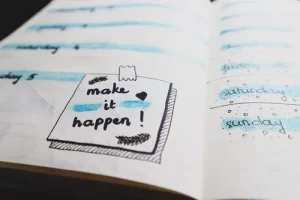At some point in life, everyone has problems.
You can accept responsibility for them or not, seek to downplay or exaggerate them, but really in the end, you have basically two options— ignore them or do something. Ignore them and eventually they may go away, blow up, or someone else will fix them. Some people prefer this route and it may work out for them …sometimes.
Me, I belong to the “do something” camp.
My one-foot-before-the-other attitude towards problems

Everyone has problems at some point. It’s what you do about them that matters.
Now to be fair, doing something doesn’t always work. You know you don’t need to burst that pimple, but (un)fortunately for me I don’t get a lot of pimples. The majority of my problems are of the sprained ankle variety, and I attack them that way. This is what I do:
- I recognize immediately there is a problem.
- I assess the severity of the problem, then I do what is necessary to stem the damage.
- I find a remedy and give it some time to work.
- Then, I test the fix by walking, gingerly at first, but always one foot in front of the other, through the discomfort, until the situation is back to normal.
- Finally, I make sure to guard against a similar injury/mistake in the future.
Assigning blame doesn’t fix a problem, doing something about it before it gets bigger, does.
Recognize there is a problem
Some problems hit you in the face, WHAM! Others, you kind of glimpse them in your side vision and you have to take a second look to really see them. Either way don’t fool yourself, the problem exists.
Doesn’t matter whose fault, that is for later. Assigning blame doesn’t fix a problem, doing something about it before it gets bigger, does.
Assess the damage; implement damage control




So, is it just a hairline crack in the stucco, or a structural defect in the house foundation? Is it a case of paying your card from the wrong account that caused your other payments to bounce, or is it a full blown case of identity theft?
Move immediately to stem the initial loss (like turning off the breaker if sparks are flying from the socket) until you decide on a permanent fix. Quickly and correctly assessing the damage will help you determine whether it’s a simple DIY fix, or if you need to call in the professionals without delay.
It is important that your assessment be correct, so get an expert’s opinion if you need to. Being wrong at this stage can be expensive or even deadly if the problem is medical. Really try to get it right before you act.
Find a remedy and give it time to work
Certain problems you jump up and fix right away once you know what’s wrong. For others you should bide your time and work things out until it’s right for you to act.
Said another way, medical issues you move on right away; but don’t just jump up and leave your house, marriage and everything you spent a decade working for because you finally realize your spouse has a sidekick.
Plan your departure—get your education, career and finances in order; work out legal options and then act when it suits you and not your spouse. No matter how emotional you feel, how hard or distasteful the situation, plod through it one foot in front of the other and act only when it is in your best interest.
You may feel angry, stupid, sorry for yourself, but if you plant your feet on the ground, take one step towards the solution, then another to put distance between now and the problem, IT WILL GET BETTER.
Test the fix and work to get things back to normal
Getting things back to normal is not always smooth sailing.
Sometimes it means getting used to a new situation, or doing things a different way, or even finding another solution. Sometimes it’s just an inconvenience, sometimes it’s painful. Then, sometimes it’s a blessing, like finding a newer happier life after you finally shed the cheating spouse whom you also found out had put you in debt.
No matter how frustrating, painful or tiresome it gets, plod through it until the situation gets (close) to normal again; because it does, eventually.
Sometimes you will feel angry, stupid, sorry for yourself. Cut yourself some slack then plant your feet on the ground. Take one step towards the solution, then another step, and another to put distance between now and the problem. IT WILL GET BETTER.
Guard against the problem in the future

Okay, now we can assign blame. Just remember to assess your role in the matter as well.
Maybe we didn’t cause the problem directly, but did we facilitate? Were we just standing at the bus stop on our way to work when the car drove through?
Or, did we notice the new gadgets and clothes but enjoyed the last vacation too much to ask where the money was coming from?
What did we expect if we chose to buy a new phone instead of paying the car insurance last month and now the car is sitting on top of a fire hydrant?
Learn from the mistakes of the past, yours and others. Keep a long memory of the things that caused you and others problems in the past and don’t repeat them. It may sound simple but how many time has your sister/friend picked up the same type of abusive boyfriend; or your brother/friend lost his shirt to his friend’s half baked schemes.
Finally learn to accept blame when warranted. When your “I know I’m **** BUT ***” changes to “I can’t believe I ***, never again!” then you know you’re on the right track.






